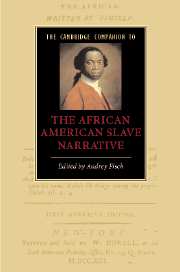Book contents
- Frontmatter
- Introduction
- Part I: The Slave Narrative and Transnational Abolitionism
- Part II: The Slave Narrative and Anglo-American Literary Traditions
- Part III: The Slave Narrative and the African American Literary Tradition
- 8 The slave narrative and early black American literature
- 9 Telling slavery in “freedom’s” time: post-Reconstruction and the Harlem Renaissance
- 10 Neo-slave narratives
- Part IV: The Slave Narrative and the Politics of Knowledge
- Further Reading
- Index
10 - Neo-slave narratives
from Part III: - The Slave Narrative and the African American Literary Tradition
Published online by Cambridge University Press: 28 July 2007
- Frontmatter
- Introduction
- Part I: The Slave Narrative and Transnational Abolitionism
- Part II: The Slave Narrative and Anglo-American Literary Traditions
- Part III: The Slave Narrative and the African American Literary Tradition
- 8 The slave narrative and early black American literature
- 9 Telling slavery in “freedom’s” time: post-Reconstruction and the Harlem Renaissance
- 10 Neo-slave narratives
- Part IV: The Slave Narrative and the Politics of Knowledge
- Further Reading
- Index
Summary
The critical context
The institution of slavery in the United States was a site of unimaginable physical, emotional, and spiritual cruelty, justified by greed and racism, and sanctioned by religion, philosophy, and the law. Written into the nation's founding documents, its very existence betrayed the contradictions at the heart of national identity and consciousness. It is thus little wonder that it has compelled a rich, challenging, and demanding body of cultural products, from sorrow songs and work songs, to the antebellum narratives written by individuals who had emerged from a system that denied them literacy, to an extraordinary genre of retrospective literature about slavery that exploded in the last decades of the twentieth century and shows no signs of abating.
According to conventional wisdom, the term “neo-slave narratives” originated with Bernard W. Bell's 1987 study The Afro-American Novel and Its Tradition. Bell described “neo-slave narratives” as “residually oral, modern narratives of escape from bondage to freedom,” although over time that definition has expanded to include a more diverse set of texts than Bell's initial description could have anticipated. This genre, which includes some of the most compelling fiction produced in the last fifty years, has evolved to include texts set during the period of slavery as well as those set afterwards, at any time from the era of Reconstruction until the present. They approach the institution of slavery from a myriad perspectives and embrace a variety of styles of writing: from realist novels grounded in historical research to speculative fiction, postmodern experiments, satire, and works that combine these diverse modes.
- Type
- Chapter
- Information
- The Cambridge Companion to the African American Slave Narrative , pp. 168 - 186Publisher: Cambridge University PressPrint publication year: 2007
- 19
- Cited by



